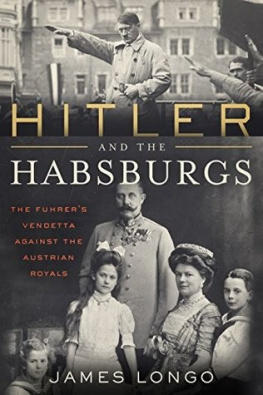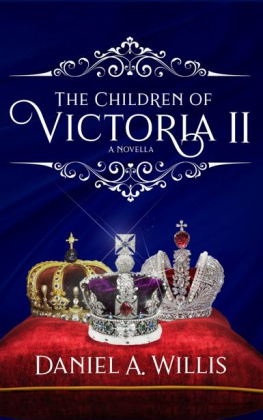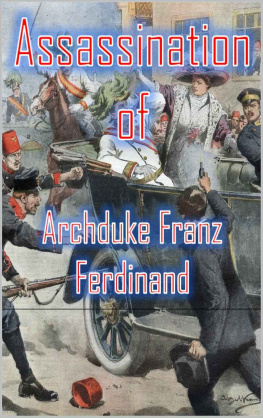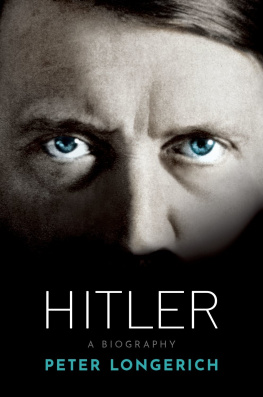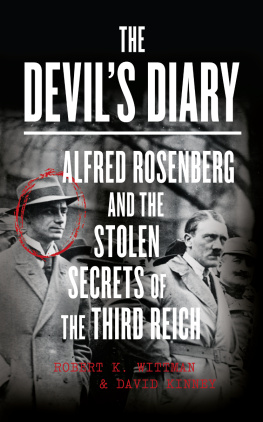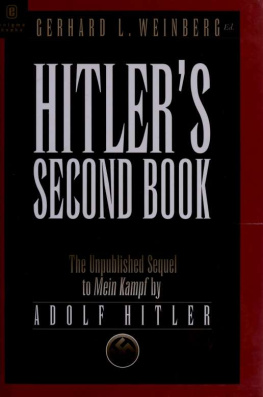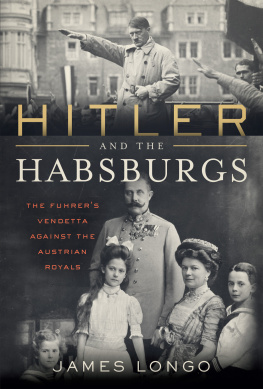
Diversion Books
A Division of Diversion Publishing Corp.
443 Park Avenue South, Suite 1004
New York, New York 10016
www.DiversionBooks.com
Copyright 2018 by James M. Longo All rights reserved, including the right to reproduce this book or portions thereof in any form whatsoever.
For more information, email
First Diversion Books edition November 2018.
Hardback ISBN: 978-1-63576-476-5
eBook ISBN: 978-1-63576-475-8
Printed in the U.S.A.
SDB/1811
1 3 5 7 9 10 8 6 4 2
For my wife, Mary Jo Harwood, and
HSH Princess Sophie de Potesta of Hohenberg
CONTENTS
CHAPTER ONE
HITLER AT THE HOTEL IMPERIAL, 1938
I resolved that night that someday I would come back to the Imperial Hotel and walk over the red carpet in that glittering interior where the Habsburgs danced. ADOLF HITLER
At five thirty on the evening of March 14, 1938, Adolf Hitlers gray and black Mercedes-Benz limousine slowly drove past Schnbrunn Palace to the Hotel Imperial in the heart of Vienna. The forty-eight-year-old native son was returning to conquer the city, and the country, that once conquered him. Twenty-five years earlier, Hitler had been a homeless vagrant on Viennas streets, a hungry dreamer sitting on a park bench in Schnbrunns public gardens. Ten years later, he was sent to a German prison for treason. By the spring of 1938, he was the undisputed dictator of both nations.
Schnbrunn Palace and Vienna had once been home to the Royal and Imperial Habsburg family, rulers of an empire stretching across Europe and around the globe. The seeds of Hitlers remarkable rise to power, his Faustian rags-to-riches story, could be traced to his hatred of the Habsburgs and their multinational vision for the future of Europe.
Hitlers sleek, heavily armored convertible needed no bulletproof windows or armor that day. Hours earlier his army of one hundred thousand German soldiers had seized his Austrian homeland without a shot fired. Thunderous cheers greeted him as he stood erect and unsmiling for all of Austria and the world to see. Many unbelievable political and military victories would soon be his, but none was sweeter than this one. His greatest dreams since childhood were to unite Austria with Germany, and to destroy everything the Habsburg Empire represented to him. Everything else grew from these dual ambitions. On that deceptively mild March afternoon, he had achieved half of his goals. The second half would kill millions and destroy much of Europe.
Adolf Hitler could have stayed in any of Viennas magnificent palaces but insisted on staying at the Hotel Imperial. It held a powerful attraction for him. Two decades earlier when he was a failed art student reduced to earning money by shoveling snow, a crystalizing experience occurred right on that hotels doorsteps. The occasion was a reception honoring the Habsburg heir to the throne, Archduke Karl, and his wife, Archduchess Zita. The evening Hitler triumphantly returned to the city that had rejected him, he shared only one story with his entourage about his five fateful Vienna years. The memory he shared was of that bitterly cold night:
I could see the glittering lights and chandeliers in the lobby, but I knew it was impossible for me to set foot inside. One night, after a bad blizzard which piled up several feet of snow, I had a chance to make some money for food shoveling snow. Ironically enough, the five or six of us in my group were sent to clean the street and sidewalk in front of the Imperial Hotel. I saw Karl and Zita step out of their imperial coach and grandly walk into this hotel over the red carpet. We poor devils shoveled the snow away on all sides and took our hats off every time the aristocrats arrived. They didnt even look at us, although I still smell the perfume that came to our noses. We were about as important to them, or to that matter to Vienna, as the snow that kept coming down all night, and this hotel did not even have the decency to send a cup of hot coffee to us. I resolved that night that someday I would come back to the Imperial Hotel and walk over the red carpet in that glittering interior where the Habsburgs danced. I didnt know how or when, but I waited for this day and tonight I am here.
His rapt listeners applauded his story of the once forgotten man who had turned the world upside down. Few people in history had come from so little, or risen so high, in such a short period of time. Now, on the evening when Adolf Hitler united his adopted country of Germany with his Austrian birthplace, his thoughts turned not to celebrations, but to vengeance. They were not directed toward Karl, who died in 1922, or Zita, who lived in Belgian exile. Instead they fell on the royal orphans of Archduke Franz Ferdinand, the man whose 1914 assassination sparked the First World War. Shortly before Hitler arrived at the Imperial Hotel, Duke Maximilian Hohenberg, the Archdukes oldest son, his wife, and five children fled the same hotel to go into hiding.
Within hours of Hitlers return to Austria, the Duke would go from being the human face of the state to being denounced as an enemy of the state, and exchange his palace home for a Nazi prison. His fall from grace was as dramatic as Hitlers rise to power. Adolf Hitler and his Nazis had an enemies list of thousands of Austrians to be liquidated. Within weeks, seventy-nine thousand arrests were made, but the first two men the Gestapo arrested, deported to Germany, and imprisoned at Dachau were not Jews, Czechs, or the foreign immigrants Hitler denounced and demonized. The night of his greatest triumph, the first two Austrians the Fhrer ordered arrested were Maximilian and Ernst Hohenberg, the sons of Franz Ferdinand. He told Herman Goering and Heinrich Himmler to show them no mercy, a challenge the competitive rivals readily embraced.
Following Austrias seizure, Hitler also ordered the Gestapo to undertake a more clandestine mission. Gestapo agents were told to help the Jewish doctor who cared for his late mother in her last fatal illness to immigrate to the United States. Two Jewish officers he served with in the First World War were also provided his personal protection. Like his family doctor, they were allowed to escape the Holocaust he would soon unleash on Europes Jews. Hitlers infamous anti-Semitism could be selective, but he was unwilling to show mercy to Franz Ferdinands sons. The hatred directed toward them was more personal than Hitlers animosity toward their dead parents or his aversion to the millions of innocent victims about to die in his name.
Yet even as the arrests of the Hohenberg brothers made headlines in Europe and America, the women who loved them would fight back. Their wives, sister, and female allies would wage an unrelenting guerilla war against the Nazis in Vienna, Prague, and Berlin to free them. Hitler and his Gestapo would be up against the intelligence, strength, and resilience of women motivated by love as much as the Nazis were motivated by hate.

The seeds for Adolf Hitlers vendetta against the vanished Habsburg Empire, the dead Archduke, and his royal orphans were planted even earlier than his snowy encounter with the Habsburgs at the Hotel Imperial.
Shortly before Hitlers birth in the Austrian border town of Braunau am Inn, Crown Prince Rudolph, the thirty-year-old charismatic heir to the Habsburg throne, died by his own hand, or by assassination. The governments clumsy cover-up made the truth elusive. Englands Ambassador spoke for many when he exclaimed, It is all mystery, mystery, mystery. The Habsburg Empire, the lynchpin of central Europe for six hundred years, never fully recovered. Emperor Franz Joseph had only one sonRudolph. No daughter or female relative could inherit the throne. To fill the dangerous vacuum created by Rudolphs death, the Emperor reluctantly selected his oldest nephew, Archduke Franz Ferdinand, as his successor. It was not a popular choice. The Archduke was thought to be a dead man walking, a sickly introvert no one expected to live. The abrupt disappearance of the popular Crown Prince from the public stage thrust Franz Ferdinand into a role not suited for his brittle personality. Stefan Zweig, Austrias most famous novelist, wrote that Franz Ferdinand lacked the thing most valued by the Viennesecharm.
Next page
